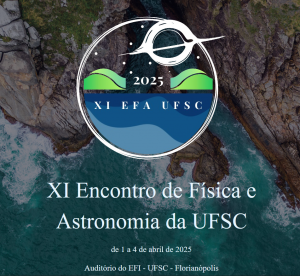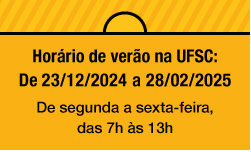Sorry, this entry is only available in Brazilian Portuguese. For the sake of viewer convenience, the content is shown below in the alternative language. You may click the link to switch the active language.

O XI Encontro de Física e Astronomia da UFSC será realizado em Florianópolis, no auditório do EFI da UFSC, entre os dias 01 e 04 de abril de 2025. Com inscrição gratuita, contará com palestras de especialistas e minicursos técnicos em diversas áreas da física e astronomia, além de sessões de apresentação de pôsteres e seminários (submissões até o dia 19 de março).
Confira detalhes no site do evento: https://encontro-pgfsc.ufsc.br/2025
Sorry, this entry is only available in Brazilian Portuguese. For the sake of viewer convenience, the content is shown below in the alternative language. You may click the link to switch the active language.

Sorry, this entry is only available in Brazilian Portuguese. For the sake of viewer convenience, the content is shown below in the alternative language. You may click the link to switch the active language.
Em razão do recesso e período de férias, não haverá expediente na secretaria da pós-graduação das 12h do dia 20/12 até 10/01/2025.
O atendimento presencial retornará no dia 13/01 (das 07h às 13h).
The Postgraduate Program in Physics at the Federal University of Santa Catarina announces the final results of the selection process for admission to the PPGFSC 2025/1:
Click here to check.
Sorry, this entry is only available in Brazilian Portuguese. For the sake of viewer convenience, the content is shown below in the alternative language. You may click the link to switch the active language.
O Programa de Pós-Graduação em Física da Universidade Federal de Santa Catarina torna público o resultado final do Programa de Doutorado Sanduíche no Exterior (PDSE/CAPES) para início das atividades no exterior no segundo semestre de 2025.
Resultado final
The Graduate Program in Physics of the Federal University of Santa Catarina hereby announces the rectification of the preliminary results of the selection process for admission to the PPGFSC 2025/1:
Master’s Degree:
Where it reads:
“1-Candidato desclassificado por não cumprimento do item 3.2, II “i” e 4.14 do edital”
Read:
“1- Candidato desclassificado por descumprimento do item 4.14 do edital: cartas de recomendação não enviadas dentro do prazo estabelecido no item 3.8 do edital / Candidate disqualified for non-compliance with item 4.14 of the notice: letters of recommendation not sent by the deadline set out in item 3.8 of the notice.”
Doctorate:
Where it reads:
“1 – Candidato desclassificado por não cumprimento do item 8.3 do edital.”
“2- Candidato desclassificado por não cumprimento do item 3.2, II, “k” e 4.16 do edital.”
Read:
“1 – Candidato desclassificado por não cumprimento do item 8.3 do edital / Candidate disqualified for non-compliance with item 8.3 of the notice.”
“2- Candidato desclassificado por descumprimento do item 4.16 do edital: cartas de recomendação não enviadas dentro do prazo estabelecido no item 3.9 do edital / Candidate disqualified for non-compliance with item 4.16 of the notice: letters of recommendation not sent by the deadline established in item 3.9 of the notice.”
Sorry, this entry is only available in Brazilian Portuguese. For the sake of viewer convenience, the content is shown below in the alternative language. You may click the link to switch the active language.
O Programa de Pós-Graduação em Física da Universidade Federal de Santa Catarina torna público o Calendário 2025
Clique aqui para acessar o documento.
The Postgraduate Program in Physics at the Federal University of Santa Catarina has published the preliminary results of the selection process for admission to the PPGFSC 2025/1:
Click here to check.
Sorry, this entry is only available in Brazilian Portuguese. For the sake of viewer convenience, the content is shown below in the alternative language. You may click the link to switch the active language.
Divulgamos o resultado preliminar do Programa de Doutorado Sanduíche no Exterior (PDSE/CAPES) para o ano de 2025.
Resultado preliminar
The Graduate Program in Physics of the Federal University of Santa Catarina – UFSC – announces the list of the approved applications (post-appeals) to the Admission Process entrance at the semester 2025/1.
Click here and have access to the registered candidates’ list and their respective situations in the admission process.









